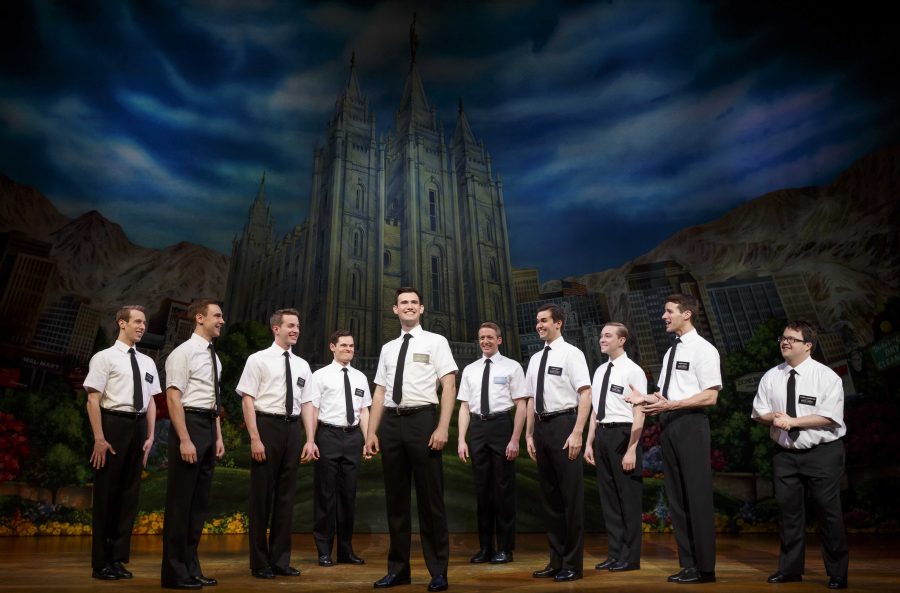By Claire Dietz
The Book of Mormon begins with a doorbell, sitting there, waiting to be rung.
As the lights go up, the audience is greeted with what is, to some, an all-too-familiar sight: an eager and beaming missionary of the Church of Jesus Christ of Latter-Day Saints, commonly known as LDS, standing in the doorway.
On Wednesday evening, Book of Mormon was received by a full house at the new Hancher auditorium, in what could be seen as a match made in heaven. What better way is there to break in the beautiful new space than with one of the century’s most acclaimed, and riotous, musicals?
To orient the audience before diving into its trademark comedy, the Book of Mormon begins with a recounting of the LDS’s backstory, and the history of the Book of Mormon, as it was revealed to the founder of the LDS church Joseph Smith.
The story itself follows Kevin Price and Arnold Cunningham, a couple of Church Elders for the LDS, as they venture to a village in Northern Uganda for their mission trips. Once they arrive, however, their trip takes a turn towards the absurd, as they encounter an environment that none of their books could’ve truly prepared them for.
Having previously seen this show twice—both times in Chicago—I found myself going into the evening with an interesting question in mind: how differently would an audience in Iowa City react to this play as opposed to the audiences of Chicago? What jokes would land harder, which would be the bigger laugh lines?
In the first act, many of the raunchier jokes and plot points—the ones the musical has become infamous for—were met with guarded humor by the audience. It was a hesitant kind of laughter, the kind that occurs when people are trying to gauge the reactions of others before allowing themselves a full-fledged laugh.
The first act is filled with a variety of modifications on—or perversions of—the classical musical: extravagant numbers in purple sequined vests, emotionally-charged tap dancing routines, war lords with ideas of gaining control over all the surrounding villages.
Of course, there is also a song modeled after the classical “I want…” formula, in which Elder Cunningham realizes his desire to make a difference in the world, but must first battle his consciousness, which consists of Joseph Smith, his father, the Hobbits, Darth Vader, and Uhura from “Star Trek.” Even in the moments when the musical does slip into trope, it does so with an acute sense of self-awareness that imbues it with both a degree of unprecedented comedic commentary.
As the piece continued, and the stage was varyingly filled with visions of Orlando—where Elder Price dreamed of going before he was sent to Uganda—a red, fiery hell and a baptismal station, more of the audience opened up, allowing themselves the full, hearty laughs that had been heard so often in the theaters in Chicago.
The Book of Mormon is at times outlandishly boisterous, to some nearly unbearable, and sometimes—even—deeply touching. Just as South Park, the former brainchild of Book’s co-creators, Trey Parker and Matt Stone, this musical thrives on prodding the uncomfortable topics that society has deemed either too taboo or just plain awkward to address. With its no-holds-barred humor, the story serves as a large-scale cultural critique, in which no topic, no person, no institution is safe from satire.
The Book of Mormon
Where: Hancher Auditorium, 141 E. Park Road
When: 7:30 p.m. Friday, 2, 7:30 p.m. Saturday, 1, 6:30 p.m. Sunday.
Cost: $60-$135



